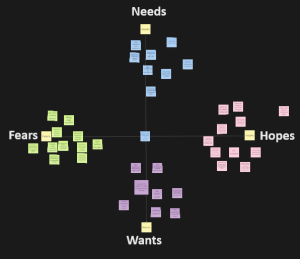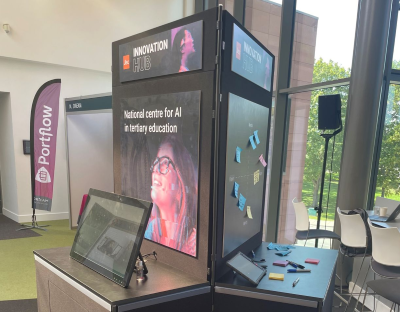This year, we kicked off the academic year with our attendance and stand at ALT-C hosted at the University of Warwick. We had a stand for the National centre for AI to showcase our AI demos sparking numerous intriguing debates and conversations and received some great feedback. Overall we spoke to around 88 people over the three very hot days. In traditional Jisc style we integrated a post it feedback grid as part of our stand, capturing Hopes, Fears, Wants and Needs. In this blog, we’ve compiled and analysed the feedback to share the key takeaways:

Hopes
We had a lot of discussions around creativity and the hope that AI would by taking on the more mechanistic tasks free staff up to be more creative. Also that generative AI would allow us to move beyond form and instead focus on ideas, creativity and the process of both learning and assessment. People generally hoped that students would have the skills to be more critical of their sources and that continually use of generative AI had not reduced the capacity for intellectual growth.
On the tools front, people hoped for a range of approved Higher Education applications, including a platform to support self-learning skills.
Fears
Conversations also touched upon the rapid evolution of AI and the uncertainties surrounding its potential impact. Concerns about the risk of “dumbing down” educational processes were raised. Participants worried about possible job losses, such as the role of Learning Designers becoming obsolete. However, discussions leaned towards the likelihood of evolving roles and the need to acquire new skills. Privacy concerns emerged, with individuals apprehensive about sharing too much data when using generative AI tools. People were generally concerned that generative AI hype and excitement could lead to bad business decisions if there wasn’t critical review of outputs.
Wants
In the Wants category, common themes emerged. Participants sought more guidance on ethical AI usage, including addressing bias and intellectual property concerns. Our recently published Artificial intelligence and ethics training module may help. Those in staff roles expressed a desire for not only access to training resources but also the freedom to experiment.
Participants requested more examples of good practice, especially from creative disciplines. Collaboration among sector bodies was a recurrent desire, aligning with our commitment to collaboration as a default approach.
Needs
Unsurprisingly, discussions highlighted the need for developing digital skills that adapt to the changing landscape. Supporting staff in acquiring these skills, including overhauling digital literacy, was a prevalent theme. There were numerous requests for guidance on understanding and mitigating bias and assessing various AI tools. Encouragingly, participants recognized the need to incorporate generative AI into assessment redesign. Additionally, there was a strong call for institutionally licensed tools with clear usage guidance for both staff and students.
Find out more by visiting our Artificial Intelligence page to view publications and resources, join us for events and discover what AI has to offer through our range of interactive online demos.
For regular updates from the team sign up to our mailing list.
Get in touch with the team directly at AI@jisc.ac.uk

